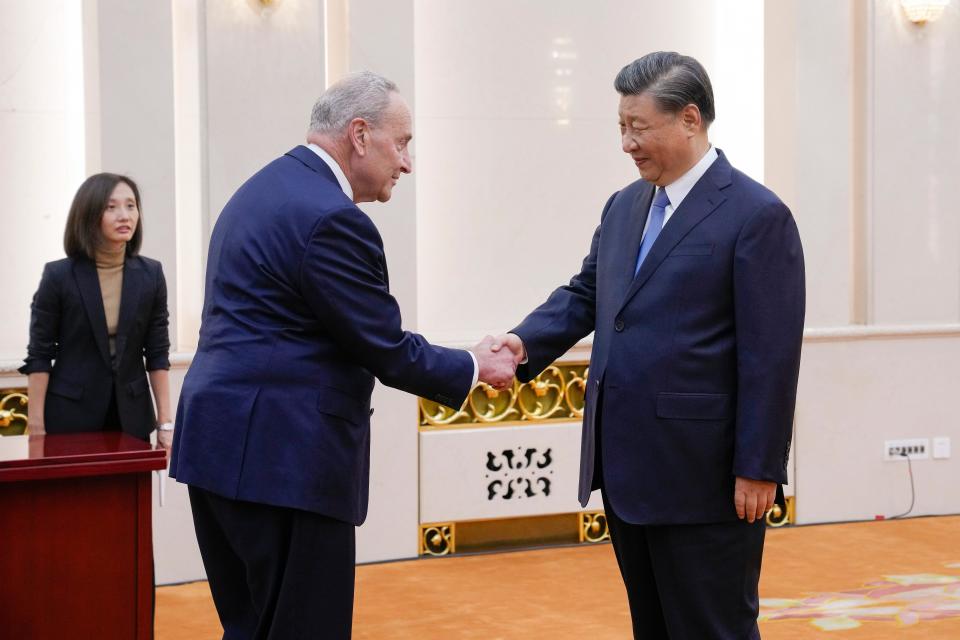Why sanctions to punish China and Russia keep failing to achieve US goals
Amid war and violence abroad, the United States wants to support a stronger, safer, freer world by punishing countries like Iran, North Korea and Russia with sanctions. Instead, the more sanctions are used, the less they are effective as countries adapt and band together against U.S. pressure.
To improve results, America and the international community need to make two big changes: first, to define upfront the terms for lifting sanctions; and second, to set up dialogues that accelerate those choices. Making these changes now could help the United States avoid war with China.
Sanctions often fail to achieve goals because problems are never frozen in time – conditions and relationships change based on events. Sanctions are written to anticipate these changes by leaving open ended the specific conditions required to lift them. But a moving target of what countries need to do to restore their status has done more to deepen suspicion of the purpose of the sanctions than to accelerate resolution of the underlying problems.
North Korea adapts to survive sanctions on nuclear program
Take North Korea. Every U.S. administration from George H.W. Bush to Donald Trump has tried to negotiate the end of Pyongyang’s nuclear program. Negotiations have been conducted in different formats, with different partners and with the support of the international community. In a few cases, agreements have been concluded and implementation has begun. But time after time, agreements have collapsed due to mutual mistrust.
The result is that North Korea is now able to strike U.S. territory with a nuclear-armed missile, and it has also adapted to survive under the sanctions regime.
Replace armistice with peace agreement: 70 years have passed since Korean cease-fire. It's time to end America's longest war.
The North Korean government has easily passed the cost of sanctions onto its citizens while decision-makers live large. Moreover, North Korea has adapted to sanctions by finding workarounds. In short, sanctions have lost their leverage.
No single administration is at fault for these developments. Each team went into negotiations wanting to make the best deal possible at the time. But from North Korea’s perspective, the continual ratcheting up of conditions to meet for even limited sanctions relief has led its officials to draw a stark conclusion – that the United States and the international community seek not just the elimination of the North Korean nuclear program, but also the collapse of the country itself.
China is watching how the US handles North Korea
China has watched these developments with increasing apprehension. North Korea’s survival is strategically important for China in serving as a buffer zone between China’s border and the United States and its major allies in Northeast Asia – South Korea and Japan.
China also sees itself in the crosshairs of U.S. sanctions. Beijing is learning from Pyongyang’s ability to adapt to sanctions that it might also need to withstand significant near-term pain to achieve long-term goals that Washington opposes – including forced reunification with Taiwan.
Taiwan’s representative to the US: Stop following China. United Nations is ruled by 'we the peoples,' not authoritarian regimes.
When Chinese President Xi Jinping tells his people to prepare for struggle, his frame of reference is the North Korean – and the Russian – experience.
China is equally suspicious that the United States seeks to undermine the Chinese Communist Party – with sanctions as the primary tool. Sanctions are not working to create leverage in the U.S.-China relationship. On the contrary, the broad scope of sanctions against Chinese officials and companies, and the lack of dialogue to negotiate their removal, have accelerated strategic mistrust.
Opinion alerts: Get columns from your favorite columnists + expert analysis on top issues, delivered straight to your device through the USA TODAY app. Don't have the app? Download it for free from your app store.
Rather than preventing war by punishing China with nonmilitary means, sanctions are building the case within China that America is determined to keep China weak.
Simply put, if sanctions cannot be negotiated, then they can either be avoided by working closely with other sanctioned countries, addressed through China’s own economic coercion or removed by force. Sanctions are accelerating the dynamics that undermine stability in the U.S.-China relationship.

Beijing does not believe that Washington is willing to ever lift sanctions and trade restrictions, and it maintains strong relationships with other sanctioned countries to preserve its options if the U.S.-China relationship completely breaks down. The way U.S. sanctions are applied deepens mistrust, creates avenues for partnerships outside of the U.S.-led global financial system and builds up barriers to successful management of the U.S.-China relationship.
Sanctions remain a key tool in the U.S. arsenal, but they must be more carefully and strategically applied. To start, sanctions should only be imposed alongside clear and unchanging conditionality for their removal. Problems do evolve, but sanctions are not the best means to manage that evolution.
Clear conditionality for removal at the onset of sanctions imposition would decrease suspicion that sanctions are aimed at regime change, rather than regime behavior. Specific conditions create specific objectives to take to the negotiating table.

The United States cannot stop midstream – an ongoing dialogue process must be an essential condition of sanctions implementation for two reasons. First, sanctions are only as strong as their enforcement. Other countries need to continuously buy in to the purpose of sanctions, or loopholes are easy to find and exploit.
Second, sanctions are an acknowledgement of an underlying problem, not a resolution of the problem. Dialogue is the only way to prevent sanctions from freezing in time while the underlying problem worsens and the sanctioned country adapts.
Rorry Daniels, managing director of the Asia Society Policy Institute, is a leading expert on the North Korean nuclear program, U.S.-China relations and cross-Taiwan Strait relations.
You can read diverse opinions from our Board of Contributors and other writers on the Opinion front page, on Twitter @usatodayopinion and in our daily Opinion newsletter. To respond to a column, submit a comment to letters@usatoday.com.
This article originally appeared on USA TODAY: China, North Korea keep adapting to sanctions. How does US avoid war?

